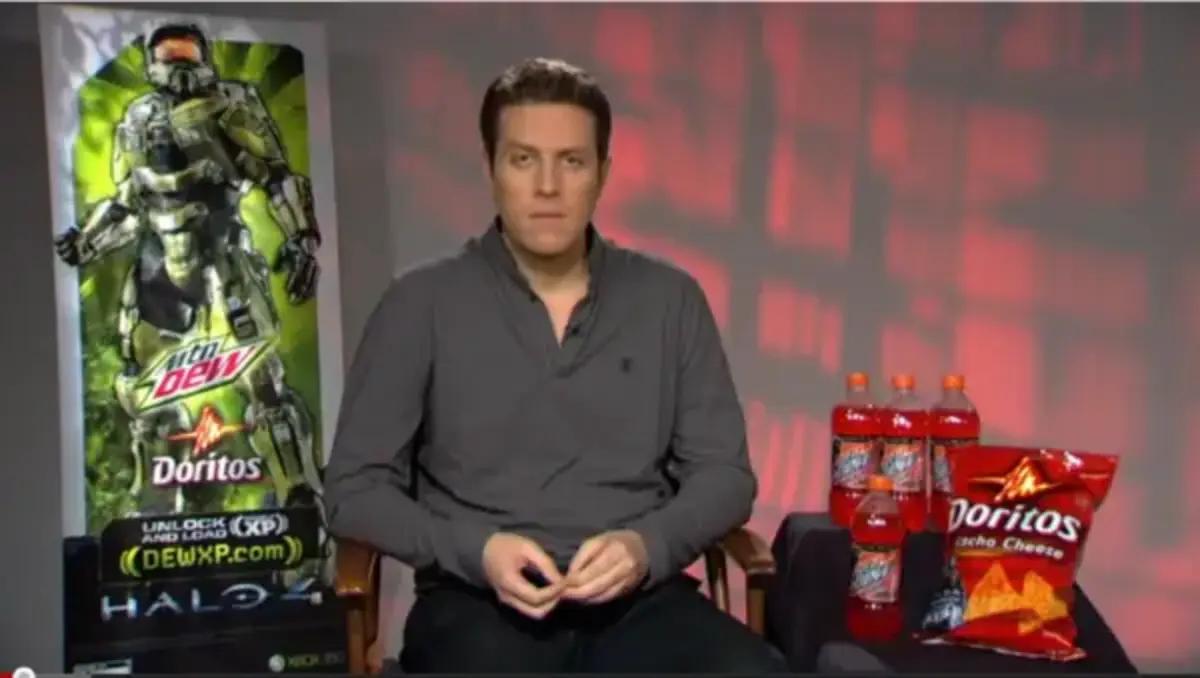The games industry deserves a better spokesperson than Geoff Keighley

Welcome to the Geoff Keighleys 2050, sponsored by Glunk Juice – don’t get drunk, get Glunk!
[Audience claps]
I’m your host, Geoff Keighley, and I’m back again with another celebration of video games.
[Audience claps and woops]
It’s been another great year for video games.
[Someone shouts, “We love you, Geoff”]
We have a great selection of wuurld premeeers tonight from a variety of studios that could afford the small six-figure sum, but before we go on, we’ve got a special surprise. Can we get a big round of applause? It’s the man, the legend, and my best friend, Hideo Kojima’s desiccated brain in a jar!
[Audience claps and throws up]

We’ve all seen the photo of The Game Awards’ Geoff Keighley sitting with his hands crossed on his lap, nacho cheese Doritos and Mountain Dew on his left, and a photo of Master Chief (sponsored by Mountain Dew and Doritos) on his right. The Dorito Pope. You know it, I know it. We all know it.
I remember the initial controversy. I remember how people said it proved that Keighley was somehow compromised. That his integrity was in question. At the time, I felt sorry for him, with his sad, glassy eyes and his pile of uneaten chips. I thought these accusations were overblown. Perhaps the situation was forced on him. I mean, he didn’t exactly look happy about it.
Now? I’m not so sure.
Earlier this month, PC Gamer created a visual chart of 16000 layoffs across the games industry. A white space full of red dots, each signifying a person impacted by a tsunami of redundancies, some highlighted with speech bubbles filled out with impact statements from those affected. Since then, there have been thousands more.
Sony laid off 900 developers just yesterday. Sony London Studio – developer of The Getaway – is closing entirely, and even staff from Sony’s major studios aren’t safe. Marvel’s Spider-Man 2 is PlayStation’s fastest-selling game, yet developers from Insomniac are being let go. Naughty Dog – the developer of The Last of Us, which spawned a successful HBO TV show – is also facing cuts. In January, Microsoft announced 1900 cuts across its games divisions, gutting many more beloved studios.
The tweet below is an incomplete list of all the video game layoffs that have happened in the past two months.
We are 2 months into 2024, here is a list of a lot of some layoffs that have happened gaming wise:
— Pyo 5️⃣ (@mrpyo1) February 27, 2024
- Microsoft: 1900 people
- Sony: 900 people
- Unity Software: 1800 people
- Twitch: 500 people
- Riot Games: 530 people
- Discord: 170 people
- Playtika: 300-400 people
- Lost Boys… pic.twitter.com/l1TlBOFcjg
We’re in unprecedented times, and even if you don’t care about the human cost of these layoffs (and you should), think about the brain drain. Final Fantasy 7 Rebirth director Naoki Hamaguchi recently said that the secret to his game’s success is that he retained 80-90% of the team that worked on the previous title.
Staff, skill, and knowledge retention are vital to making good art at large scale. Even corporate drones should understand this. The labor is the project.
I understand why celebrities and studio heads get the spotlight at The Game Awards. Keighley is desperate for the show to be seen in the same light as the Oscars. Wheeling out Keanu Reeves and putting on musical talent builds the buzz around the show with the people who have never licked a Nintendo Switch cartridge. Their attention probably wouldn’t hold for lengthy speeches from passionate developers, so acceptance speeches are cut short, and celebrities are played up along with trailers for upcoming games. Fortunately, we still have the DICE Awards, which is doing a brilliant job of making space for developers without telling them to get off the stage so we can play the next advert.
Final Fantasy 7 Rebirth review – beyond expectations but doesn’t stick the landing
But who does Geoff Keighley’s platform serve beyond Geoff Keighley? As an organization, The Game Awards says the right things, with forward-thinking initiatives such as Future Class, which is supposed to lend a platform to marginalized young talent, but what’s the point when you just ignore those people when they call for change? Keighley won’t do anything that could affect his profit margins unless that thing is sticking up for his best friend, Hideo Kojima, whom he also profits from, as Kojima often uses Keighley’s platform to promote his games now.
Keighley has the largest microphone in this industry but he refuses to do anything that could potentially jeopardize his bottom line. Sure, a tweet from Keighley wouldn’t stop the games industry layoffs, but it would shine a light on the sorry state the industry is in, rather than pretending “games are better than ever”. He could be reposting job openings and signal-boosting developers. As the most influential person in the industry, he could do something.
Game Scent has been announced - @GameScentAi
— Geoff Keighley (@geoffkeighley) February 27, 2024
Sophisticated AI releases real scents alongside your gameplay including smells of:
- Gunfire
- Explosions
- Racing
- Storm
- Forest
Upgraded DLC scents include:
- Napalm
- Human Exertion
- Ocean
- Golf course
🤷🏻♂️ pic.twitter.com/RnbnyzZrKL
Instead, he’s hawking an “AI-powered” air freshener that makes your room smell like napalm and, erm, “racing”, with DLC scents you can pay extra for, including that well-known scent, “golf course”. But he put a little shrug emoji so he doesn’t think it’s actually good – genius. Still, it’s the only thing he tweeted about yesterday. Not a single acknowledgment of the industry, you know, being on fire.
I asked Game Scent AI if Keighley’s tweet was a sponsored post, and apparently, it wasn’t! So why is he doing this? He’s doing it because it’s weird, and bizarre stuff has the chance of going viral. He’s doing it to grow his already large social media presence. He’s doing it for Geoff.
You can see this same thing in his other tweets. If the news isn’t about something depressing, Keighley will share it. “With 39 months in market, life-to-date unit sales of PlayStation 5 are now tracking 7% ahead of PlayStation 4’s pace, and 68% above that of PlayStation 3,” his previous tweet reads. “(Source: Circana LLC)”.
Now, I’m pretty sure this news came from GI Biz, which I’ve linked to above. But Keighley doesn’t link out to media publications anymore. He’ll just tweet things – same with the official The Game Awards account – and pretend it just appeared, fully formed. As a former journalist, you’d think he’d at least support games media, which is going through its own rounds of layoffs, but he can’t even do that.
Sony to cut around 900 jobs in PlayStation layoffs
I’ve spoken to Keighley both in person and over email, and he seems like a decent guy. I just don’t understand why he doesn’t want to do more to help the developers his show was created to celebrate. Happy developers make better games, and people who have redundancy trauma live in a purgatorial state, in survival mode, worrying about when the next hammer will fall, instead of how to pour their souls into their art.
Even if the lip service is all a show and he only cares about the end product, much like the unsourced news in his tweets, those products don’t just appear from the ether – people work their fingers to the bone to keep us entertained. Don’t we owe them a sliver of empathy?
Even writing this piece is a risk for me. With the death of E3, Geoff Keighley’s Summer Game Fest has emerged as the only major competitor to Gamescom. All the big developers are there, all the preview opportunities, all the things I need as a journalist to do my job. In criticizing Keighley, I’m potentially jeopardizing my chances of ever being invited again. So, Geoff, I ask you as someone else who loves this industry, can you put your neck on the line in the same way? That burning in your nostrils isn’t the Gamer Scent. Wake up and smell the napalm.
